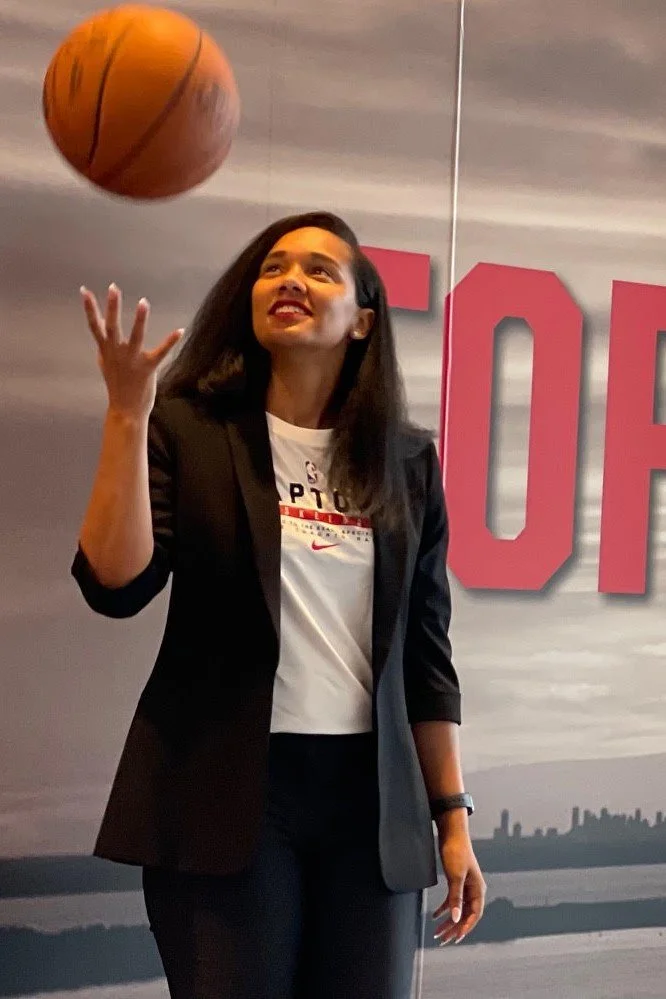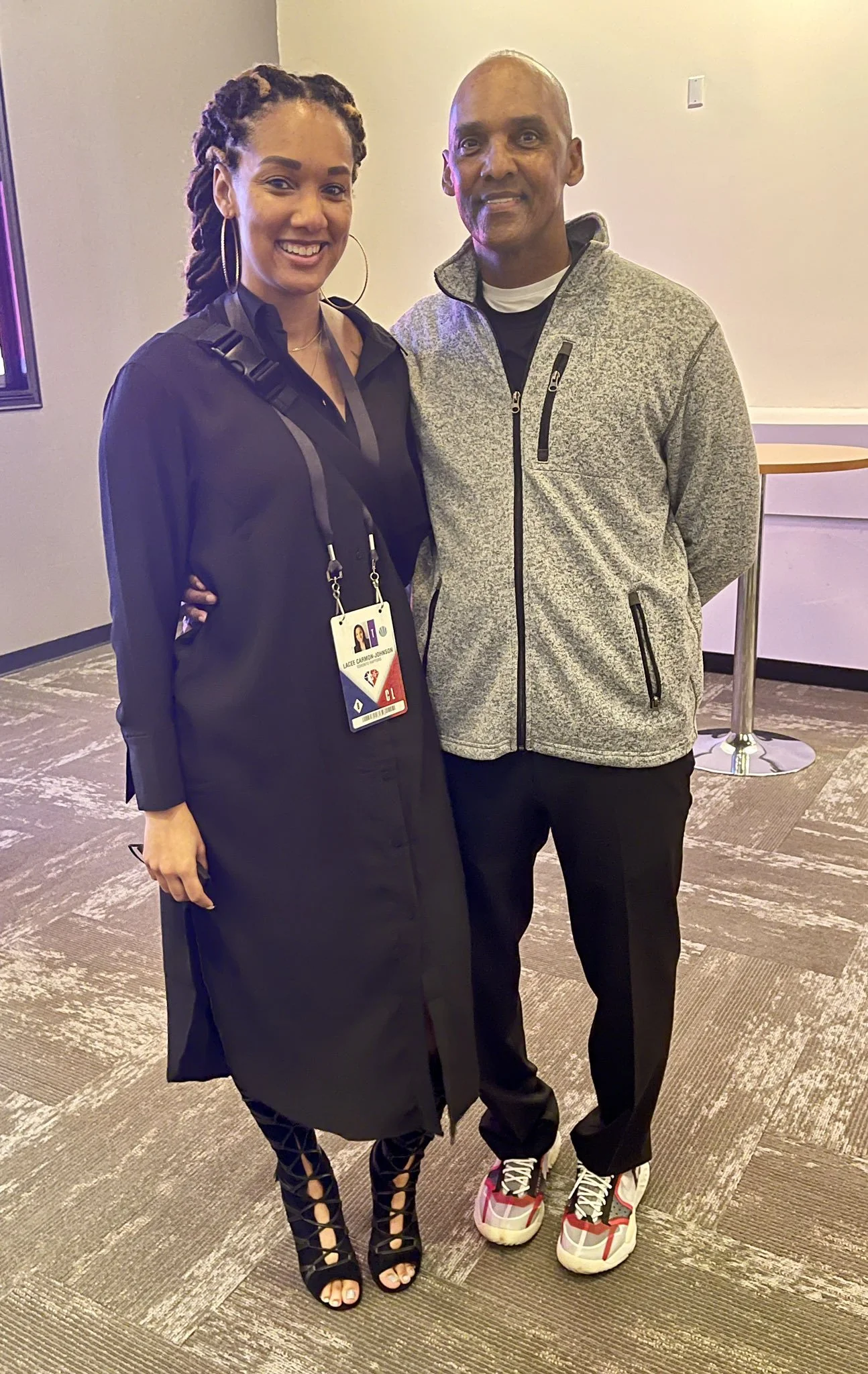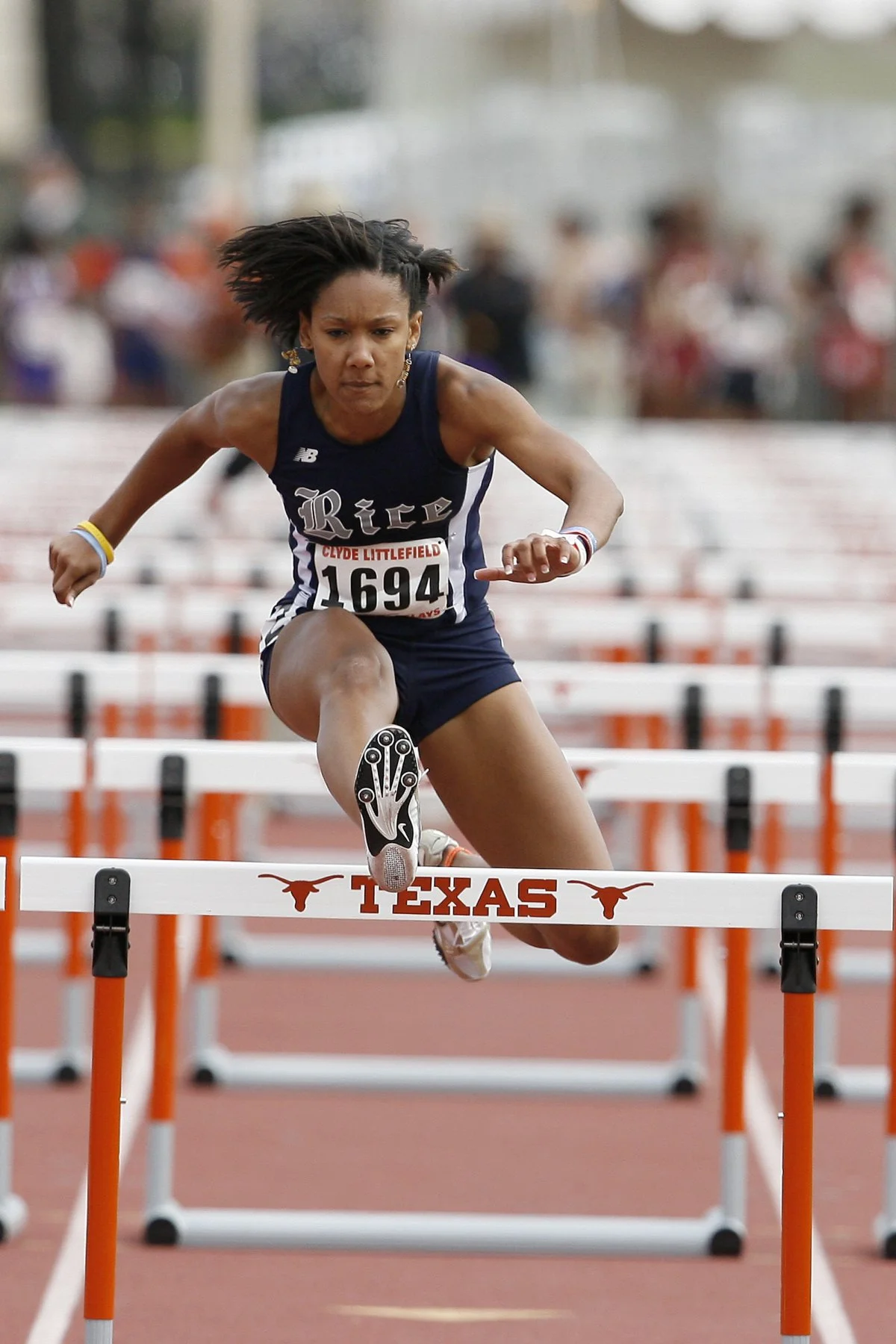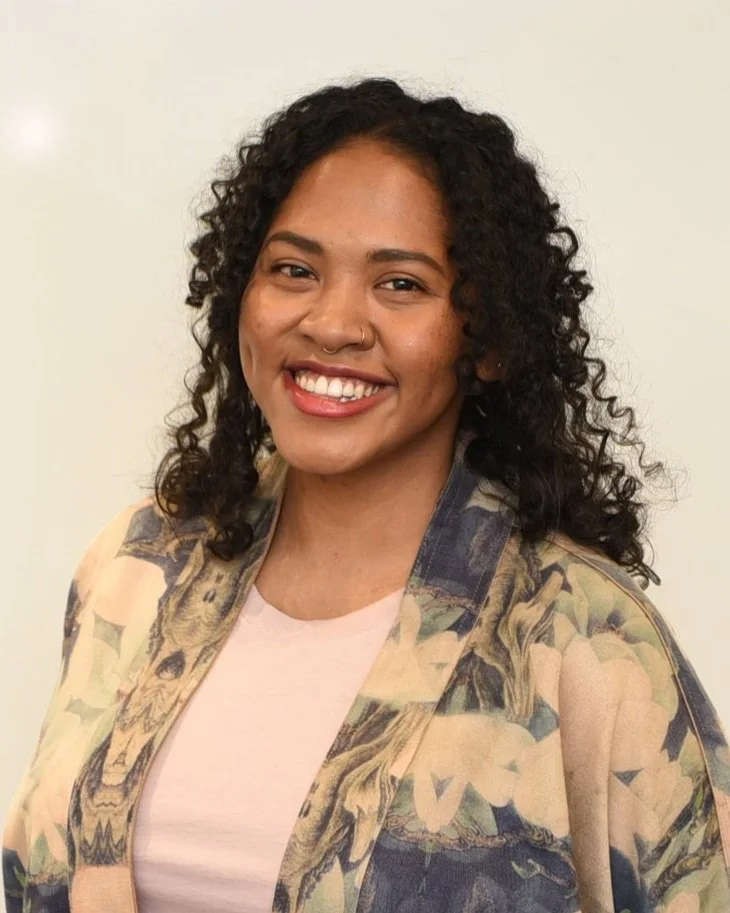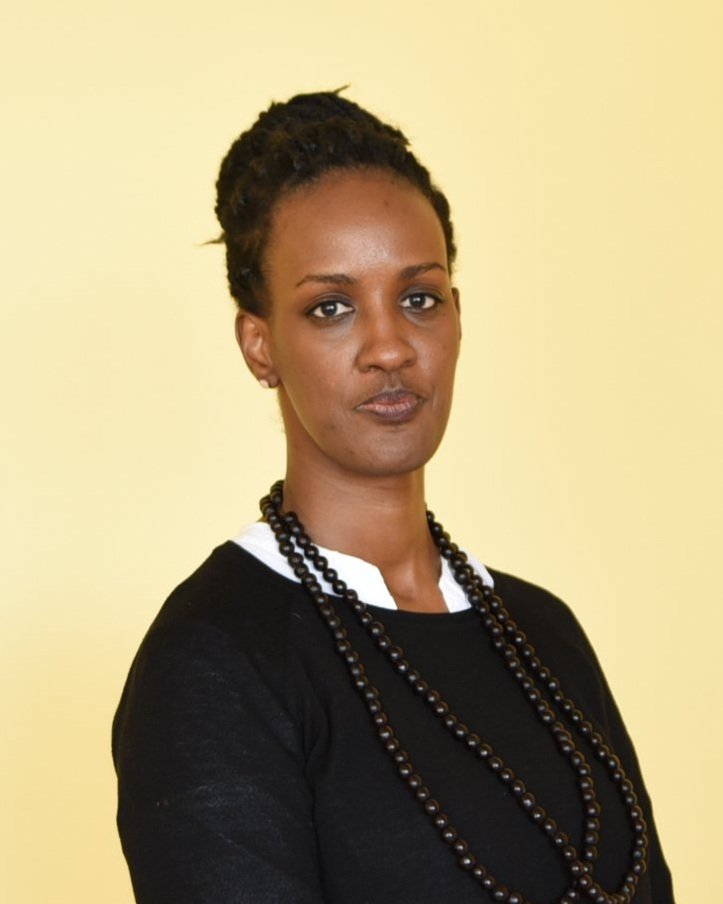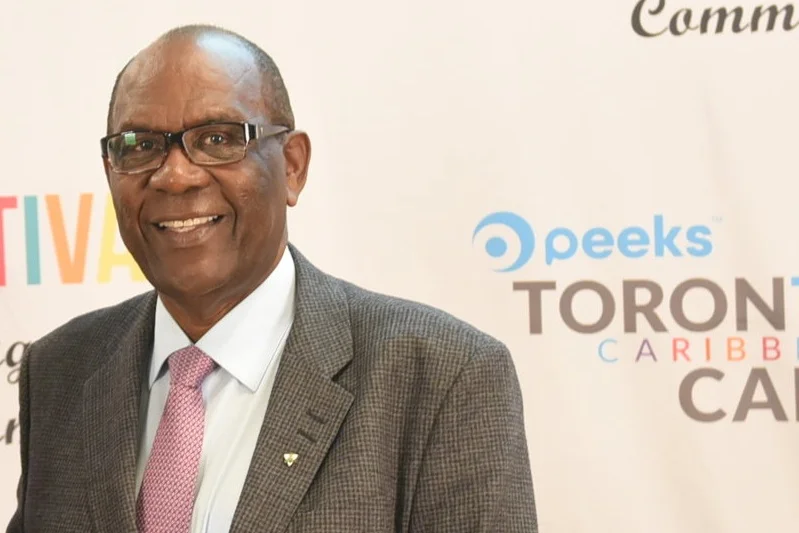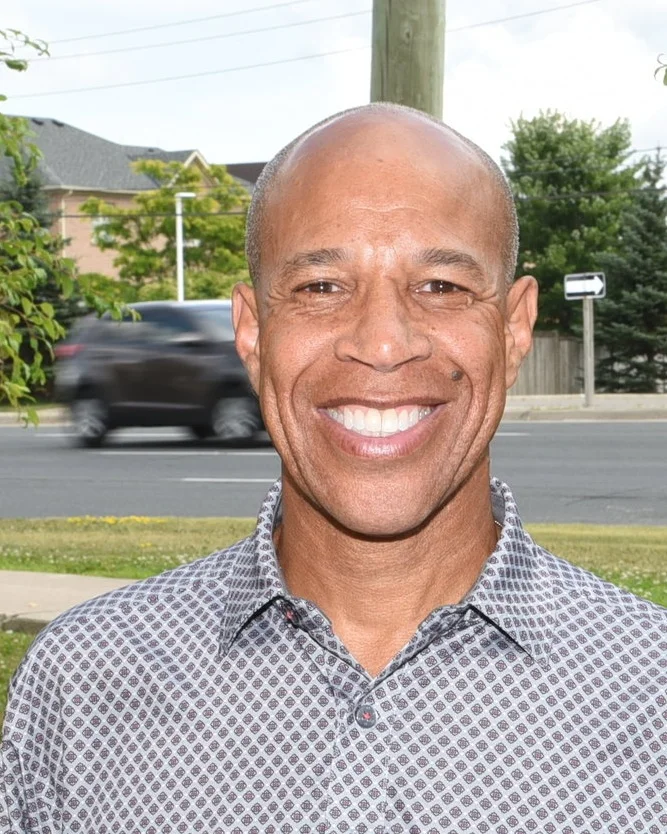Lacee Carmon-Johnson is preparing Toronto Raptors players for life after basketball
April 18, 2022
Ever since National Basketball Association (NBA) Senior Vice-President of International Basketball Operations Kim Bouhny offered Masai Ujiri the opportunity to be Director of Basketball Without Borders in 2003, he made a commitment that women will be an integral part of any organization he oversees.
There was a paucity of female staff members when the Toronto Raptors Vice-Chairman & President was hired nine years ago. Approximately a quarter of the front-office staff are female, including Dr. Lacee Carmon-Johnson who joined the only Canadian-based team in the league in July 2021.
She is the Manager of Basketball Advancement responsible for assisting players in developing leadership and career proficiencies.
Dr. Lacee Carmon-Johnson is enjoying her new role with the Toronto Raptors (Photo contributed)
A skilled curriculum developer and facilitator, Carmon-Johnson is excited to be part of a first-class organization dedicated to helping its players build success on and off the court.
“I heard so many great things about the Raptors as an organization and the city’s uniqueness in terms of its diversity,” said the Texas native who turns 36 this month. “The opportunity to live in Toronto was pretty cool for me as I have a young family and I feel comfortable moving them around a little bit. I also wanted to be part of something innovative, different and outside of the box. It is an opportunity to grow the position and grow within the position.”
The job requirements are extensive, ranging from identifying and understanding player interests and values outside basketball and facilitating their personal and professional advancement to developing and implementing a mentorship program for first and second-year players and supporting them in honing career competencies and knowledge for life after sport.
Despite the enormity of the role, Carmon-Johnson said that working with 17 players maximum compared to 500 student-athletes in her last position as Director of Professional Development/Associate Director, Academic Support at Purdue University makes the job more manageable.
“Each player needs something different,” she pointed out. “It is about identifying how we can best support them and what it is that they need. We have a very young squad (the average was 25.6 entering the season and the league average is 26.2) and that has led to some growing pains on the court. Off the court, just with having so many guys who are first-year players and second-year players who did not live in Toronto (prior to the lifting of COVID-19 restrictions) was a bit of a challenge that we all had to experience. Just the level of what it takes to be a pro in this league is really the focus for some of the younger guys. For the older ones, it is immersing back into the Toronto community. They love it, they want to give back and they have found opportunities that fit their niches.
“We are here to support them. It is like having those conversations of what areas of interest do you have, how can we potentially make any connections work and what can we do to be there from a supportive standpoint. With all of that, we are limited on time. For us, the priority is winning on the court and we understand that these things off the court help players win in life. So we have to be very strategic with scheduling and time management.”
Many high-functioning professional athletes lose sight of the need to plan for life after sports.
As a result, the transition could be very difficult.
“The ball is only going to bounce for so long,” said Carmon-Johnson. “There are many players who didn’t complete their college degree and they come into professional sports leagues without having that piece of paper to their name that would let them, at least, know there is another avenue they can pursue. What we are doing now is helping them figure out what avenues are of interest to them and how we can make that work for them. Not everyone is guaranteed more than one contract. We have a guy on the team who has been in the league for about 15 years (Thaddeus Young is in his 14th season) and has had several contracts. That is an anomaly. There are a lot of guys who don’t make it past their first contract. This is not going to happen forever and realistically even if you play for 10 years, you might be 32 or 33 years old. You still have your full life ahead of you, so what are you going to do next and how are you going to continue to make money. Do you plan to live off the money you made and how are you going to be fiscally responsible to do that? There are so many different ways to look at it and it is different for each person.”
Dr. Lacee Carmon-Johnson and her dad during the Toronto Raptors road trip through Texas in February (Photo contributed)
Most of Carmon-Johnson’s work in the last decade has revolved around producing successful student athletes.
A Track & Field Assistant Coach at Marshall University alongside her first husband Willie Johnson who died in November 2017 at age 34, she was also the Assistant Director of the Student Athlete Success Centre at Western Kentucky University (WKU) and Purdue Athletics Director of Professional Development.
“I think I have a pretty extensive body of work behind me and my transferable skills span different areas,” said Carmon-Johnson who, in 2017, was a member of the WKU team that received $100,000 in funding to conduct research designed to enhance student-athletes’ psychological wellbeing and mental health. “I am grateful for that. It is very non-traditional and I have always received a lot of flak for it. But it makes me who I am and I am not going to back down.”
Her interest in sport started at a very young age.
Carmon-Johnson remembers lying in her father’s arms late at night watching ESPN’s SportsCenter.
“I loved it and I learnt how to keep score in golf and some of the rules of tennis,” she said. “Even though I wasn’t playing, I still wanted to know. It gave me the time and space to be with my dad. We would watch games and if something happened, he would send me a text or video.”
Graduating magna cum laude from high school, Carmon-Johnson completed a double major in Kinesiology and Psychology in 2008 at Rice University where she competed in the sprints, hurdles and triple jump and was a four-year letter winner and Arthur Ashe Sports Scholar.
Two years later, she graduated from Stephen F. Austin State University with a Master of Education in Kinesiology. Her thesis examined the factors that affect Black women head coaches in Division 1 athletics. She achieved a PhD in Education-Athletic Administration at Northcentral University in 2016.
Dr. Lacee Carmon-Johnson double majored and was a member of four conference championships at Rice University (Photo contributed)
Jim Bevan, who joined the Rice University track & field staff the same year Carmon-Johnson was born, considers her a treasure.
“Lacee is always passionate about what she was doing and she had an infectious effect on those around her,” he added. “She was a pleasure to work with and be around. I did see her in a profession working with others as she is a ‘people person’ and I did see her having a huge impact on others.”
Talent alone doesn’t make a leader as Carmon-Johnson has shown.
In high school, she was the basketball captain even though she wasn’t the team’s best player.
At Rice, she was a walk-on.
Having had to work hard for everything she has achieved, Carmon-Johnson do not take success for granted.
“Nobody is going to outwork me,” she says. “I have never been the best or the smartest, even when I played sports. You learn to push a little bit harder. I can’t control the talent level that I come in with, but I can control my heart, passion and drive that I bring daily. I have been like that since I was a little kid. When I started playing organized basketball, I wasn’t as good as the other girls, but I was the best person on the team at the end of the season. I competed hard every day, I asked questions and I wasn’t afraid to get into the ‘nitty-gritty’ to find out what I could do to make the team and myself better. I didn’t have to score the most points. Just understanding that my role was to be a good teammate was just as important. I don’t have to be the star to make an impact.”
Growing up, Carmon-Johnson aspired to be an orthopedic surgeon. When she realized she couldn’t have conversations with patients in surgery, she changed course.
During her undergraduate studies, a professor – noticing she likes talking – suggested lecturing as a career path.
“I thought okay, I will look into it and here we are,” said Carmon-Johnson who enjoys travelling and reading and is an Adjunct Professor in WKU’s graduate-level Recreation & Sports Administration program. “My life is consumed with coaching people and building relationships. I am grateful for the gift of gab and I love what I am doing. I am glad that I didn’t go into a career where, after 10, years, I might have sought a change.”
Prior to joining the Raptors, she came to Canada once to play in a basketball tournament in Calgary.
To help with the transition as she settles into a new environment, Carmon-Johnson – whose partner lives and works in the United States -- brought her mother to care for her two sons.
“Mom is a strong and resilient woman who has always been there for me,” she said. “I come from a long line of praying women and her prayers have kept me going when I didn’t know how to pray for myself sometimes. I am forever indebted to her and just super grateful that she is able to help me out with my kids and be part of her grandchildren lives.”
Carmon-Johnson’s last child was born during the pandemic.
While juggling motherhood and the demands of a new job, she relishes the ability to raise her sons and watch them grow.
“I absolutely love my boys and having the ability to show them a life that I didn’t even know existed when I was a kid,” said Carmon-Johnson, whose younger brother -- Sean Carmon and his sister were born on the same day two years apart -- is an award-winning dancer. “I lived right around the corner from a college campus, but never went to college games. It is just fun watching my kids grow up and learning different things.”


